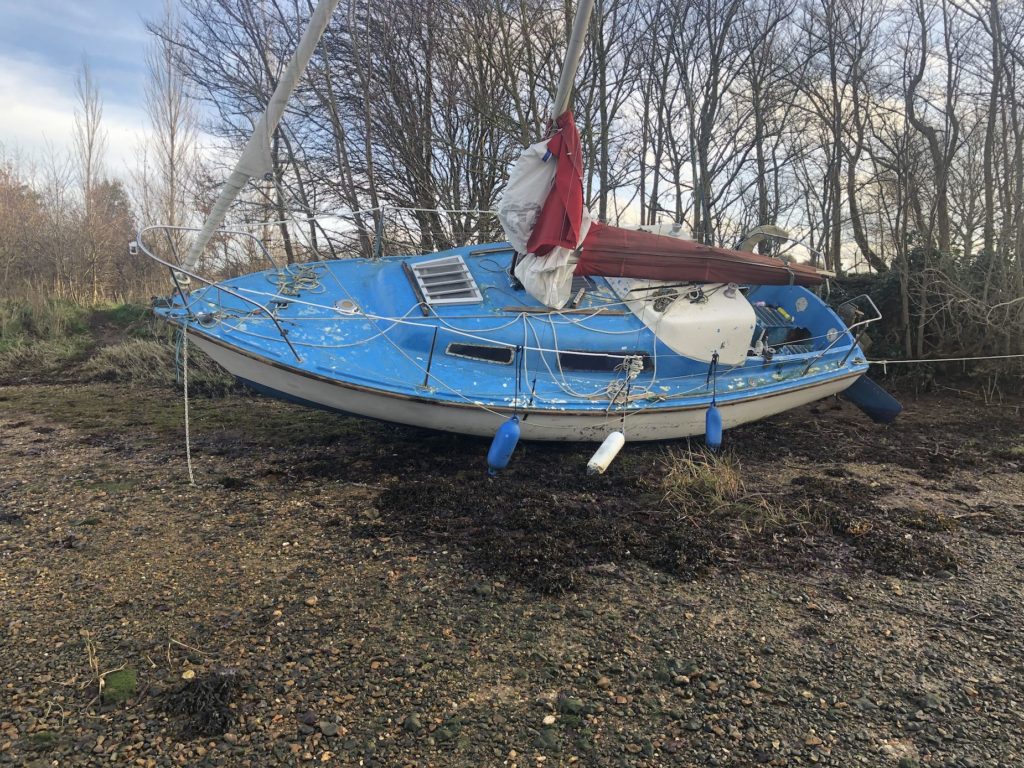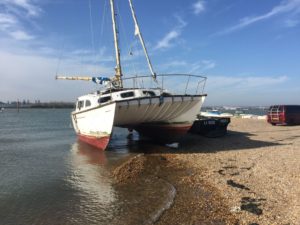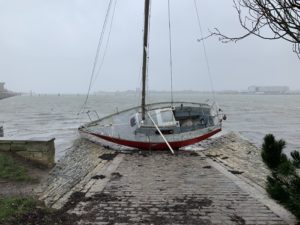The marine industry’s sloping shoulders for end of life boats

Without a common plan, and a strong lead, the UK’s shores will be a dumping ground for end of life boats. “Who will take responsibility?” asks boat recycling expert Luke Edney in the final part of our series.
End of use boats are a challenging issue for the UK. The end of life disposal process is costly so more and more boats are dumped. But where is the leadership to solve the issue going to come from?
Developments in ideas for recycling of end-of-life boats are beginning to gather pace. The biggest issue that would be a real game changer for boat disposal would be to find a greener solution for Fibre Reinforced Plastic (FRP) hulls.
Across Europe, the US and Canada, lots of ideas are being floated that can all contribute to dealing with the problem. Slowly but surely, countries with vast numbers of boats are waking up to the fact that they need to get plans in place for end of life.
But while there are different solutions suggested, we at Boatbreakers think it’s important that a common plan is adopted. As if there are different rules in different countries the chances are the countries with the more lenient rules will end up as dumping grounds. After all, this is how the UN study on old boats came about as people sailed to Tahiti then flew home.
UK’s dumping grounds
We already see this happening on a smaller scale in the UK. Some unscrupulous boat owners have noticed that if they dump their boats on Eastney beach in Portsmouth, either the Harbour Board or Council end up scrapping them. Usually at the cost to the taxpayer or those paying harbour fees.
This is a tricky situation even The Crown Estate finds itself in. Either side of Northam bridge into Southampton there is a boat dumping ground. Whilst The Crown Estate reportedly want to clear the derelict boats from its waterway, it doesn’t want to be seen to be providing a free boat disposal solution for those looking to dump boats.
 Some marinas add to the problem
Some marinas add to the problem
Dealing with end of life boats in the UK is like a big game of pass the problem. One large marina in Gosport once asked the Boatbreakers team for a price to remove a 30ft Catamaran that was definitely end of life. We gave them a price and didn’t hear back. Three months later we get a call from the Langstone Harbour Office telling us that they had a 30ft Catamaran abandoned on the beach. It turns out that the marina had sold the boat for a pound online, and then it had been dumped.
Marinas need to take some responsibility in dealing with the problem. They are happy to take thousands of pounds of mooring fees each year from boat owners. Passing on the scrap cost to a harbour board or council is unacceptable.
 Sailing clubs need to step up
Sailing clubs need to step up
Earlier this month (Feb 2020), Boatbreakers had a call from a local sailing club to ask us to remove a washed-up yacht. When we viewed the boat, it had a legal charge placed on it by the club to take ownership of her. We said we could collect anytime they like, but the club decided to wait until they are forced to remove it. The boat is currently on her side blocking a local slipway.
Inland waterways boats need to have licenses and safety certificates which are actively policed by the Canal & River Trust. We wouldn’t be surprised to see tighter rules coming into coastal waters to try and make boat owners more accountable when it’s time to scrap. As ultimately, it’s unfair for the bill to be falling in the laps of taxpayers who may have no boating interest whatsoever.
However, it’s not all doom and gloom. At Boatbreakers, we see the future of boat disposal being full of opportunities rather than obstacles. Developing a boat disposal network will create jobs, clean up waterways, make space in boatyards and marinas. Not to mention still provide plenty of work for boat transport companies. It will provide a huge stock of secondhand boat bits so other boaters can benefit through cheaper prices. Our Boat Scrapyard site is testament to how popular recycled boat bits can be.
Many thanks to Luke Edney, Communications Manager at Boatbreakers, for this fascinating series.
So, who will take the lead nationally, and internationally?
British Marine states in its National Agenda 2020 that one of its 2019-20 objectives is to ‘create a new environment roadmap bringing up-to-date structure to its approach on key issues such as air quality, pollution control and end of life vessels’.
MIN contacted both British Marine and the Department for Environment, Food & Rural Affairs to ask whether they have a working party dedicated to the issue, or any plans to hold the industry to account, or for any further information, hoping for a positive ending to a depressing story.
“Defra is committed to tackling plastic pollution, preventing waste, driving up recycling rates and cutting down landfill so we leave the environment in a better state than we found it,” a Defra spokesperson says.
“We know certain types of waste, including fibre-reinforced plastic boats, are difficult to dispose of, and we welcome ongoing work by industry to solve this problem. We’re also engaging on work on this issue through the International Maritime Organization.”
Currently MIN has not received a statement from British Marine.












